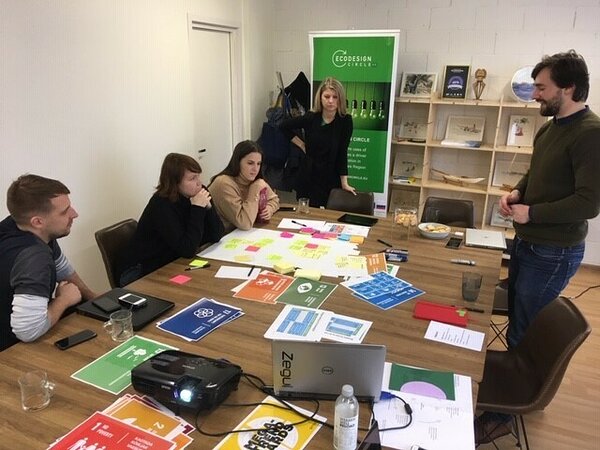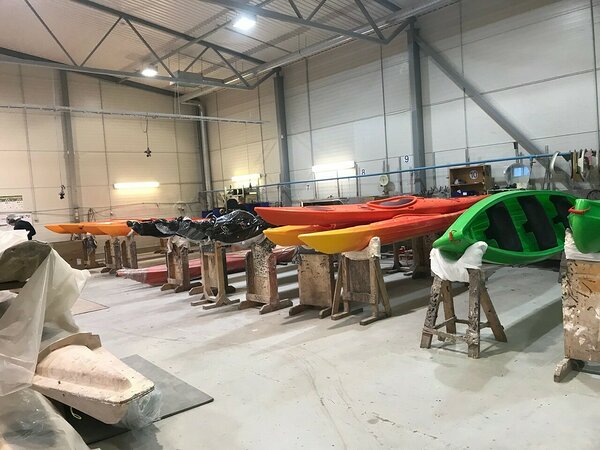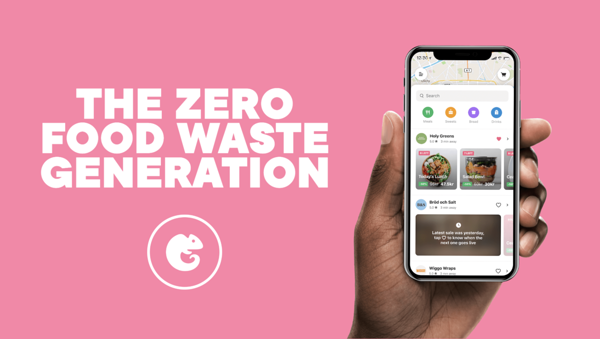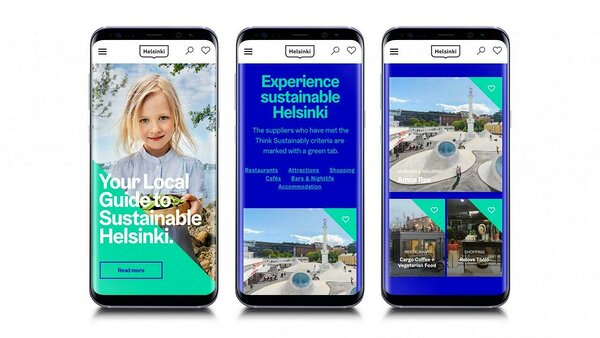Speed up the transition with Circular Design
Why is Circular Design so important? What is the EcoDesign Sprint 4.0?
On 29 March 2021, Design Forum Finland, Estonian Design Centre and the Swedish Industrial Design Foundation (SVID) organized the webinar “Speed up transition with circular design”. Why is circular design so important? What can be learnt from the EcoDesign Sprint 4.0 as applied in an Estonian enterprise Tahe Kayak? What are the inspirations from two convincing app solutions in Sweden and Finland - Karma and Think Sustainably?
EcoDesign Sprint 4.0 in Estonia | ©Kaire Rannik, Estonian Design Centre
Design methods and design mindset can considerably contribute to creating a better functioning world and society. Complex problems can be grasped and solved. To understand customers and their needs, companies can use different design methods. Circular design is also a tool to develop products and services in a comprehensive way. Companies can use the strategic use of design to create sustainable growth and competitiveness by being better prepared for the challenges of both today and tomorrow.
The EcoDesign Sprint is a collaborative training programme for small and medium sized companies interested in transforming their businesses towards a circular economy. In addition, design agencies get to deepen their knowledge in circular economy concepts.
The Sprint is designed to improve operating models - linking design and principles of the circular economy and ensuring business competitiveness. The transformation to a circular economy is important across all sectors - once you have learned what impact it has on businesses, you can start to develop circular (growth) strategies. Unlike the traditional EcoDesign Sprint, the EcoDesign Sprint 4.0 is not only designed for products, but also for services.
Tahe Kayak - a manufacturer of canoes and kayaks
Tahe Kayak Company | ©Kaire Rannik, Estonian Design Centre
One of the three EcoDesign Sprint 4.0 pilots was carried out with the Estonian company Tahe Kayak. Tahe Kayak is a manufacturer of canoes and kayaks whose customers are mainly based in Scandinavia and Northern America. The company belongs to the "Tahe Outdoors" group. In the sprint, they decided to concentrate on the premium brand "Zegul".
There are two different methods of manufacturing kayaks: rotation manufacturing and customer-built kayaks. The customer-built kayaks are mostly made of many different materials, including carbon fibre and other material blends - these make the kayaks stable and guarantee a long product life, but they are also harder to recycle. The goal of the sprint was to develop a strategy for reselling used kayaks and giving them a second life.
The two-day sprint was very intensive for the participants, but it was also a huge success. The Sprint was conducted by an Estonian environmental expert (Kaisa Hansen, innovation and business centre Mektory) and an Estonian service designer: Joel Kotsjuba (Velvet design agency).
For this online event, Joel Kotsjuba summarised the ten most important key takeaways from his side:
Fight food waste by simply eating – the Karma app
As a practical example for a service-based business model, Hjalmar Ståhlberg Nordegren presented Karma and its app currently used in Sweden, the UK and France.
©Karma
Karma was founded by four Swedish entrepreneurs in 2016. Before they decided to develop an app together, the four founders had already launched a number of start-ups on their own, with varying degrees of success. By combining forces, they developed “a good deal application” - because good deals are always a good thing. However, they got lost: rather than focus on one particular thing, they explored various avenues at the same time to improve the world. After only moderate success of their app, they sat down and decided to focus on one particular avenue: making restaurants, cafés and supermarkets reduce their food waste.
Through Karma, consumers can buy leftover food at a reduced price and pick it up just before closing time. They benefit because they spend less money on good food, while providers benefit from increased outreach and lower costs for disposal of the "waste" food. Along the way, our planet also benefits through less waste and fewer wasted resources.
About 12% of the Swedish population is already using Karma regularly. In France and the UK, the number is rising steadily. Karma has now saved over 5 million meals and over 2.5 tonnes of CO2 emissions. The app is used by over 10,000 restaurants and has 1.5 million users. Still, just selling the surplus won't solve the problem alone. In the future, Karma should help to prevent food surpluses in the first place, ensuring that only as much is produced as can actually be consumed.
Think sustainably – embedding sustainable choices into your everyday life
Another practical example comes from Finland: an app which triggers and promotes more sustainable deals and lifestyle choices. Birgit Liukkonen from Helsinki Marketing, a city-owned company responsible for Helsinki’s operative city marketing and business partnership, presented their solution:
©Helsinki Marketing - “www.MyHelsinki.fi Think Sustainable service.”
Helsinki Marketing has developed the Think Sustainably service. The strategic aim is to promote Helsinki as one of the most interesting cities in the world attracting visitors, experts and investments to Helsinki. The city aims to reduce emissions by 60% by 2030 and become carbon neutral by 2035. The app combines sustainable services, experiences and transportation in Helsinki into one easy-to-use digital service. It is used by various service providers: restaurants; cafés; shops; accommodation; venues; attractions and events. The basic idea is that the app suggests service providers who claim to act in a particularly sustainable and environmentally friendly way to the end-user. The targets of the app are:
» to help locals and visitors choose more sustainable ways of living urban life every day;
» to give service providers information on what they could do better by serving as a platform for action, while giving visibility to their sustainability work;
» to encourage the acceleration of sustainable development.
The key elements of this service are trust and transparency. Providers themselves are trusted to know best how to act and which boxes they tick with regards to sustainability. They indicate which criteria they meet and which they do not. The evaluation of the service is therefore not carried out by third parties. After using the service, customers can use a feedback form to evaluate how the information on the website corresponds to reality. Helsinki Marketing staff only contact providers if consumers claim the information given was incorrect. Transparency is created through trust and dialogue between the partners and feedback from the users.
Pioneers to establish sustainable routines
These examples show that changing habits for the better needn't be a tall order. We need more pioneering companies and new initiatives to break our consumption habits, the emergence of which could be facilitated by policy frameworks and incentives, which would be a crucial step towards a more sustainable and better world.
More information: https://www.ecodesigncircle.eu/spotlight-blog/80-speed-up-the-transition-with-circular-design
Use tools to develop incremental steps towards your circular future
Author: Lisa Marie Fiebig



